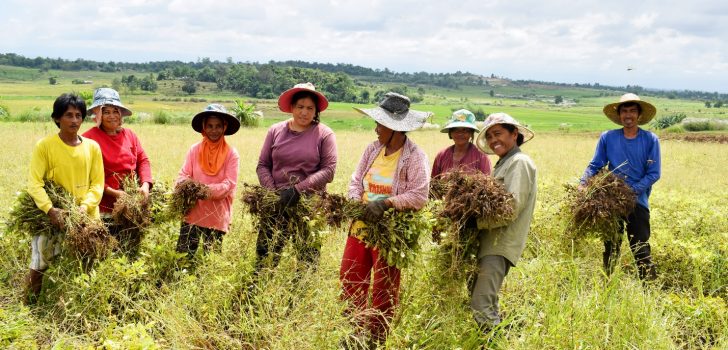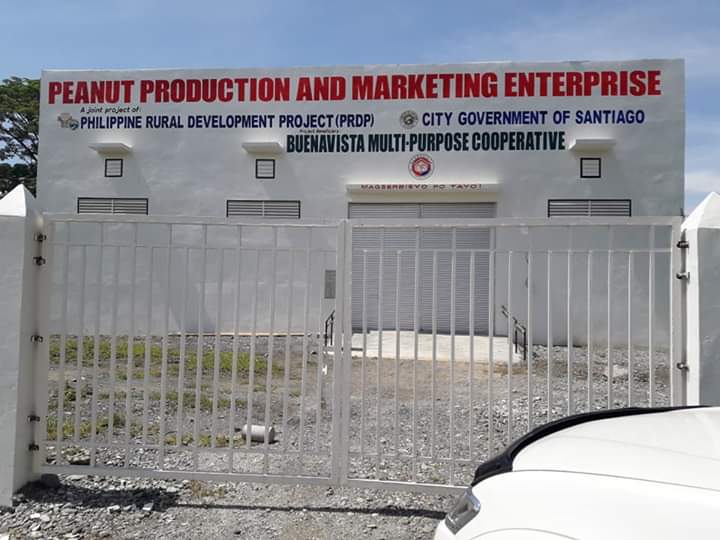
SANTIAGO CITY’S CRASH CROP NOW A PROMISING ENTERPRISE
With two other I-REAP subprojects and another being established, Santiago City’s Peanut Production and Marketing Enterprise funded under the Department of Agriculture’s Philippine Rural Development Project (DA-PRDP) has gained its momentum and has inspired farmers in the city.
Peanut is an income-generating crop to farmers in Cagayan and is one of the major field legumes grown in the provinces of Quirino, Isabela, and Santiago City.
DA-PRDP has provided good quality seeds to farmer-members, procurement of production and post-production equipment, provision of working capital, procurement of marketing facilities, and construction of warehouse as consolidation and processing center.
“The farmer-members have undergone training on Good Agricultural Practices. They were trained on proper soil cultivation and crop production,” Mr. Nilo Aquino, Business Development Officer said.
“Experts on food processing and packaging also trained the staff in the processing center on quality control,” he added.
“Two more enterprises here in Santiago City have been turned over and are now operational. These are Mungbean Production and Mungbean Seed Production and Marketing Enterprises. The fourth, Beef Cattle, is being established. The construction of the civil works is ongoing,” Aquino said.
Buenavista Multipurpose Cooperative (BMPC), with Manager Quirino Colobong, sells boiled-in-shell peanuts, salted fried peanuts, processed peanut butter, and engages in the manufacture of peanut-based confectioneries.
“The food crop has excellent nutritional value. It is an excellent food source for it contains 25- percent protein and 45-percent oil. It is also inexpensive and is a high-energy food for both humans and livestock. Our cooperative sells peanut butter to the different centers regionwide. We also have links in Metro Manila,” Colobong said.
Colobong said the impact of the enterprise could be felt from the increase of cooperative members. From 564 members, there are now 673 members with 109 motivated to join because of the equipment and the seeds procured by DA-PRDP.
“During the ECQ, we have strictly followed the protocols prescribes by the IATF. We have given facemasks, sanitizers, disinfectants to the members of the cooperative for free. We have strictly reminded our clients, those who come and transact business in our office to observe social distancing. We did not charge penalties for those who have overdue loans, at least during the pandemic. We understand life is hard with COVID 19,” he said.
“The warehouse is full with peanut harvest. We really need more space,” he sighed and look around the cramped warehouse which is filled with sacks of peanuts.
“There are many peanut sorters around. We give them advanced salary so that they can provide what their families need. They need more space. You see, we provide jobs. The tractors are income generating too for the enterprise.
“Peanut is primarily grown as a cash crop in corn-based upland areas. Santiago City has plenty of expansion sites for peanut production. All we need is to capacitate the farmers through training and assist the cooperative with equipment. We have proposed the enterprise,” Dr. Rodelio D. Diego, City Project Management and Implementing Unit (CPMIU) said.
Diego said that they have seen that peanut production is an emerging industry in Cagayan Valley but production is still low compared to the huge demand for the crop.
“Primarily, we are looking at an increase in net surplus of the cooperative from P624,332.88 to P8,218,536.33 in year one and up to P16,439,895.33 in year 10,” he added.
“The enterprise totally changed our mindset. We learned new ways of doing things. The objective set is to increase the incomes of the farmer members. The equipment procured will double the output of the cooperative. The series of training have prepared our farmer members well.” Cristina Macatangay, BMPC Chairperson said.
In the 1970s, there were many farmers planting peanuts. Their problem was how to market their produce. They then shifted to other crops. Others continued planting, borrowing from the traders.
“Now that the cooperative manages the enterprise, they can avail of loans and they do not worry much on marketing,” she said.
According to her, the harvest can now be hauled by the vehicle to be stored in the warehouse. Spoilage of peanut is no longer an issue.
“It is not only farmers in Santiago who are planting. BMPC members who live Echague, Jones, Isabela and Diffun, Quirino are also planting peanut. The enterprise buys from them. Non-members have also started planting, and soon, they will be full-time members of the cooperative. They were encouraged because of the tractor the enterprise has acquired through DA-PRDP, and the improved services of the cooperative,” she said.
“We have the first harvest last October. The cooperative will be busy buying the produce of the farmers. Similarly, the staff in the processing center will be kept occupied.” Macatangay quipped. (Dr. Ferdinand Cortez, RPCO2 InfoACE)

